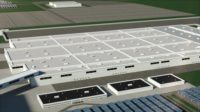Samsung Electronics plans to build a $17-billion semiconductor manufacturing facility in Taylor, Texas, about 35 miles northeast of Austin, the South Korean tech company announced Nov. 24.
The project is expected to break ground in the first half of 2022 to have the facility operating by the second half of 2024, Samsung said. Texas Gov. Greg Abbott’s office says the project will support at least 6,500 construction jobs.
No designer nor contractor for the facility has been been publicly announced. According to the economic development agreement with Williamson County, the project investment will include $6 billion in buildings and other property improvements and $11 billion in machinery and equipment.
The investment is Samsung’s largest ever in the U.S., and the largest foreign direct investment in Texas on record. The firm says the major plant, known as a fab, will serve as a key facility in its global semiconductor manufacturing along with its latest production line that opened in Pyeongtaek, South Korea, earlier this year.
As part of the agreement, the general contractor will be required to hire as many Taylor residents as possible, with that firm and subcontractors having to hold local recruiting fairs.
Samsung chose the 5 million-sq-m site in Taylor for the facility because its proximity to an existing Samsung plant in Austin will allow the two sites to share resources, and also because of factors such as local infrastructure stability, community development opportunities and government support. Texas officials say they offered Samsung a $27 million project grant to create jobsj, which is expected to include 2,000 tech jobs..
The company says the “local semiconductor ecosystem” also factored into its decision to select the Taylor site for the plant. Several tech companies and other manufacturers have moved or expanded facilities in the Austin area within the past few years, including high-profile businesses such asTesla.
The announcement comes amd a global semiconductor chip shortage that has constrained manufacturing in other fields that rely on the components, including autos and electronics.
“With greater manufacturing capacity, we will be able to better serve the needs of our customers and contribute to the stability of the global semiconductor supply chain,” Kinam Kim, CEO and vice chairman of Samsung’s device solutions division, said in a statement.
The Semiconductor Industry Association says U.S. government investments in chip research have remained flat while other countries have increased investments. Also the U.S. share of global semiconductor manufacturing capacity has dropped from 37% in 1990 to 12% in 2021.
Samsung isn’t the only manufacturer moving to increase its U.S. semiconductor production. As ENR previously reported, a $20 billion Intel project to build two fabs is currently underway in Arizona.
U.S. Commerce Secretary Gina Raimondo said in a statement that demand for semiconductors is expected to continue increasing.
“Increasing domestic production of semiconductor chips is critical for our national and economic security, and we look forward to continued partnership with Samsung and other semiconductor manufacturing companies looking to build out their capabilities in the U.S.,” Raimondo said.






Post a comment to this article
Report Abusive Comment